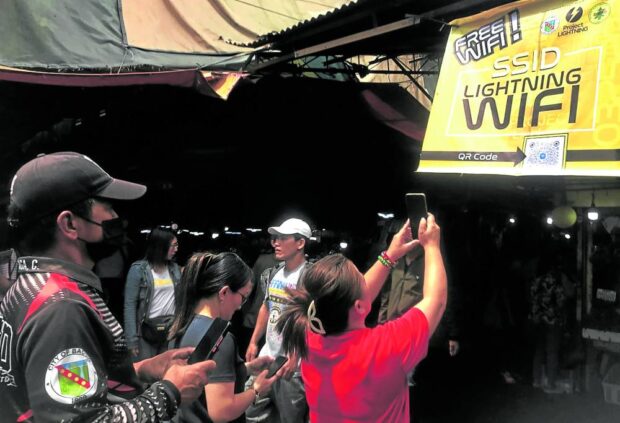
FREE CONNECTION | Marketgoers and vendors at the Baguio City public market can now avail of free Wi-Fi, which was installed on Sunday, March 26, 2023, in support of the PalengQR project of the Bangko Sentral ng Pilipinas, which encourages digital payments. (Photo by VINCENT CABREZA / Inquirer Northern Luzon)
BAGUIO CITY, Benguet, Philippines — Free Wi-Fi, using the experimental “millimeter wave” technology, was launched at the Baguio City Public Market on Sunday to help improve a digital payment program that the Bangko Sentral ng Pilipinas (BSP) piloted here last year.
PalengQR encourages micro and small businessmen like store owners, vegetable and fish merchants, and the average jeepney driver to shift from cash payments to digital transactions, which BSP touted as more efficient and safer in a world digital market.
The free Wi-Fi would address the lukewarm reception to the PalengQR project by Baguio market’s vendors.
Based on a recent survey, only about a thousand of the market’s 3,900 vendors have signed up for PalengQR because they could not all afford to buy data from telecommunication providers, said Mayor Benjamin Magalong at the market Wi-Fi launching program.
Noel Neil Malimban, BSP Northern Luzon director, said this was also their observation a year after BSP Governor Felipe Medalla launched the campaign in Baguio in August 2022.
BSP has introduced PalengQR to other cities where populations are bigger and where local governments could afford to subsidize Wi-Fi, Medalla told the Inquirer.
Project Lightning
Baguio, for instance, is benefiting from Project Lightning, a technology company that designed internet devices which use power lines as a vehicle for transmitting data.
On Sunday, meat and vegetable merchants, as well as tourists and other market customers, have been granted free Wi-Fi for a year by Project Lightning, said Felipe Puzon, Magalong’s chief of staff and project leader of Baguio’s five-year conversion to “smart city” governance.
Project Lightning is a private-funded initiative headed by IT developer Benjamin Gertes, which has spent two and a half years producing “proof-of-concept” that high-frequency wave bands called millimeter waves can deploy high-speed internet for short distances without any disruptions. A series of “internet mobility” devices—each separated by 100 meters—had been put up at the market to provide data services.
The group also tested egg-shaped devices attached to the power lines of the Benguet Electric Cooperative that would use its “surface wave” or the magnetic field generated by electric cables to send data directly to households.
Gertes said his team redesigned the oblong transmitter developed in 2017 by an American telecommunications company into a portable, less expensive gadget that is suited for any terrain and climate in the country. The device was tested in high mountain ridges and during typhoons that struck Baguio.
Growing e-wallet accounts
But given the unstable internet connectivity in the countryside, Malimban said he has reached out to the Department of Information and Communications Technology (DICT) to open free Wi-Fi for rural communities like the highland provinces of the Cordillera once BSP pushes digital payments in remote areas.
“BSP’s task is to produce the list of towns that would require free Wi-Fi,” he said, “so DICT can inspect these areas and determine the resources needed to introduce Wi-Fi.”
The number of Filipinos engaged in digital payments has increased, accounting for 31.2 percent of e-commerce transactions in 2021, up from 20.1 percent in 2020 when the coronavirus pandemic struck, according to the BSP at a March 14 briefing here.
Before the pandemic, digital transactions were logged at 10 percent in 2018 and 14 percent in 2019, suggesting that the increase in the number of online merchants during the pandemic may explain the bigger volume of digital payments, according to Maureen Franco, bank officer of BSP’s department of payments policy and development.
She said the number of e-wallet accounts grew from 41.1 million in 2019 to 138.8 million in 2020 and made up to 1.7 billion transactions during the first pandemic year.